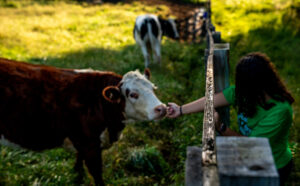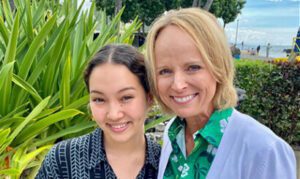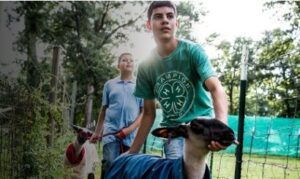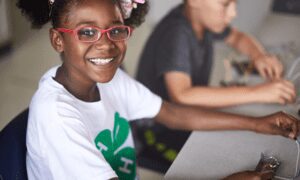“My Mom couldn’t afford to send me to college,” she remembers, “but the administrators at Alcorn State University [Alcorn] and my community rallied around me. They made sure that I had the resources I needed to go to college and be successful.”
As the Youth Specialist and Program Leader at Alcorn State University, Ms. Erby develops 4‑H programs in career readiness and leadership, leads workshops and training sessions for educators, and sources opportunities for young people in the community from youth-serving organizations. She took some time to share with me why she gives back to the community that supported her.
Manola Erby (ME): It all began in a small community called Shiloh. I was eight years old; it was 1966 or 1967. We had a small 4‑H club with about 10 members called the Shiloh 4‑H Club. We met monthly—at the Shiloh Baptist Church or in a member’s home—but it was usually at my home. It was still quite segregated at the time, so there were only African American kids in our club.
We learned various skills, including meeting management, parliamentary procedures, and life skills—all things you need to know to be successful in life. There was a formal dress code for club meetings, teaching us how to dress for an occasion. Club officers were required to develop a meeting agenda, which was reviewed by a volunteer leader or a parent. I served as President for three years, so that helped me to learn a lot of leadership skills. The experience helped me to become a leader. It inspired me to take on other leadership roles in my community and school.
Do you recall some of the projects and activities that you did in 4‑H?
ME: I participated in the food and nutrition project, where I learned about cooking and kitchen safety. My father died when I was five, requiring my mother to have two jobs. She left for work early in the morning and came home late in the evening, but because of what I learned in 4‑H, I was able to cook for my brother. There was also a requirement every February during Black History Month to participate in a public speaking contest. I won first place twice and second place three times. I was quite a shy kid. Participating in 4‑H developed my confidence.
Do you think your 4‑H experience influenced your collegiate studies?
ME: Yes, it played a significant role. I made up my mind when I was about 10 years old that I was going to attend Alcorn. Our 4‑H club used to take college tours, and Alcorn was the first stop. We even toured the Home Economics department. I fell in love with the school, from the campus to the people. After that experience, I knew I wanted to be a Home Economics teacher, just like many of those who inspired me.
What led you back to Alcorn for your career?
ME: After earning my master’s degree at Iowa State University, I returned to Mississippi and began teaching Home Economics in the public-school system. There was a position open at Alcorn for a home economist, which included an opportunity to work in the community. I interviewed, was hired, and fell in love with the work I was doing.
When you look back on your life, can you share some of the challenges you faced and how you overcame them?
ME: Being an African American woman, I had to work 10 times harder than the average professional. A lot of doors were closed, and at times, people didn’t think I measured up until I got there. As an African American who graduated from a historically black university, when others learned that I had received a degree from Iowa State University, sometimes the doors opened a little bit wider. The support I received, the skills I learned, and the mentors I had at Alcorn gave me the confidence, tenacity and knowledge I needed to be successful at Iowa State and beyond. I left Iowa knowing that I could compete on any level. Today, I love what I do—working with underserved communities—and it’s a passion of mine. That’s what 1890* universities do. They support the underserved and underrepresented who have limited resources.
Can you describe how 1890 universities are continuing to open doors for others and expanding knowledge in the community?
ME: I think we’re continuing to give underserved, limited-opportunity rural families resources that they wouldn’t be able to get anywhere else. We provide students with internships, so when they leave high school, they’re equipped to go into the workforce, especially if they can’t afford to go right into college. When youth attend college, it’s our job—through specific programs—to make sure they’re equipped with the tools they need to be able to graduate. Jacqueline Davis-Slay is a graduate of Alcorn State University, and she is now the legislative director at the Agricultural Research Service of the United States Department of Agriculture (USDA-ARS). We have graduates from all walks of life who have gone on to lead successful careers, and I feel like we had a part in that.
How do you think schools and programs like 4‑H can continue to encourage more diversity and inclusion while empowering minority youth to seek out leadership roles and be more involved in their communities?
ME: We need to do less traditional programs and get young people involved in things that they like and want to do. We’ve done focus groups to find out from young people what they want to do so we can develop those programs that will interest them the most. We have a 4‑H modeling team that does a full production every year at the local high school. They learn how to do tasks like lighting and sound. Some kids like to fly drones, and others are interested in hip-hop. Because we’re small and have access to small rural communities, we can encourage more African American kids to get involved in 4‑H with non-traditional programs, especially if they initially shy away from us because they aren’t interested in agriculture.
What do you hope young people will gain from the opportunities and experiences you provide, and where do you hope to see them in the future?
ME: I hope they gain a sense of confidence in themselves like I did when I was in 4‑H. I hope they build leadership skills that they can take into a classroom, a courtroom, or their communities. I hope the public speaking skills they learn will allow them to voice their opinions, be outspoken, and speak their piece. I hope they’re running this country! I hope they’ll be the next President. The next writer. The next judge. The next educator. Tomorrow’s university president.
*The Morrill Act of 1890 requires each state to show that race was not an admissions criterion, or else to designate a separate land-grant institution for persons of color. Among the seventy colleges and universities which eventually evolved from the Morrill Acts are several of today’s historically black colleges and universities (HBCUs).
















